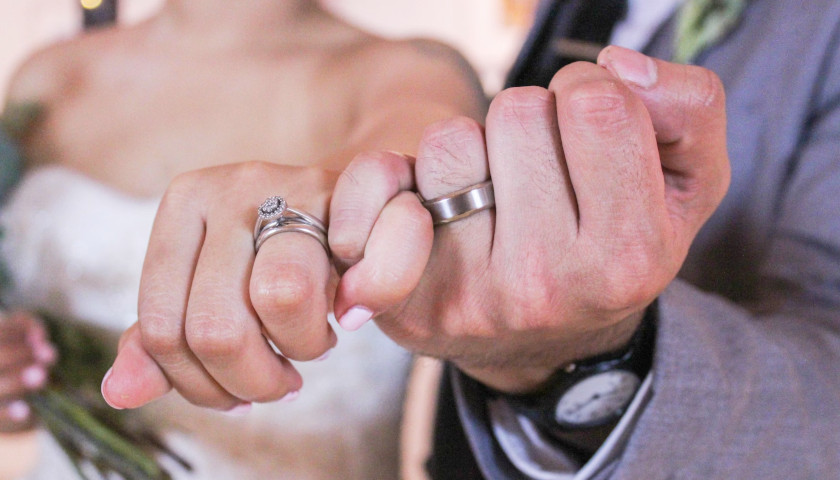by Elyse Apel
“Young people are the future” is a quip every Gen Zer has heard. Unfortunately, the “future” has lost its interest in the future. Young people are increasingly turning their backs on marriage and children, a choice that is hurting their mental and spiritual health, their physical wellbeing, and, ultimately, their happiness and sense of fulfillment with life.
As I approach graduation from college, I also approach my second wedding anniversary. Unfortunately, my husband’s and my young marriage is far from the norm in today’s society, and these new norms are hurting America’s young people.
Devaluing Marriage
The institute of marriage has been undermined in our post-feminist society, and rates have been steadily decreasing since 1980. In 1980, only 6 percent of men and women over 40 had never been married; by 2021, that number had more than tripled to 25 percent. Today, the United States is experiencing record-low rates of marriage.
Marrying young has become particularly rare. According to Art of Manliness, “In 1960, the median age for first marriage was 23 for men and 20 for women.” Now, it’s 30 and 28, respectively.
That said, according to Susan Brown, a sociology professor at Bowling Green State University, marriages today are “much more stable” than they were in 1979, the year the divorce rate “peaked.” “We’re seeing a tremendous drop in divorce among young adults in their 20s and through their 30s,” Brown told NPR. “1 in 10 people getting divorced today [are] over the age of 65.”
This is likely due to the fact that as overall marriage rates decrease, the majority of marriages become those between men and women with a strong religious background, and these individuals are the least likely to get divorced, as Brown points out. They are also more likely to get married young, and so, instead of attempting to fuse together two very different lives, the husband and wife grow and mature together, building one unified life.
Unfortunately, even though many young people still want to get married, they no longer believe it to be important for a happy life.
According to a 2023 Pew Research Center study, “Among all adults ages 18 to 34, 20% say being married is extremely or very important for people to live a fulfilling life, and 22% say having children is extremely or very important.” Instead, they value careers and friends.
In addition to deemphasizing the importance of marriage, today’s secular culture goes so far as to claim that the sexual freedom today’s youth experience outside of marriage has made them happier.
“There’s less responsibility for meeting the needs of a spouse, and coordinating living together and reducing conflict,” psychology professor Charles T. Hill told the Knot, a popular marriage and dating website. “Plus, there’s less responsibility for raising any children that may result. Those who are single have more freedom to do what they want when they want … or to play the field without commitments.”
This argument, however, has been proven false. Not only are married couples more likely to be overall happier, but they also, according to Harvard Medical School, “tend to live longer,” “have fewer strokes and heart attacks,” and avoid cancer and chronic diseases. In addition, married couples are more likely to avoid poverty, become financially prosperous, and achieve success in their careers.
In contrast, as marriage rates have decreased, the percentage of American adults struggling with depression has drastically increased, a 2023 study from Gallup found. Adults aged 18 to 29 have the highest rates of current depression or treatment for depression, while those aged 18 to 44 have the fastest-rising increases in diagnosis of the illness.
Women have been especially affected. Nearly one third will be diagnosed with depression at some point in their lives, compared to only 20 percent of men.
“The gap between the married and the unmarried in terms of financial resources, health and well-being is growing,” said Brown.
Relationships as a ‘Business’ Transaction
Daily Wire host Michael Knowles recently had a viral exchange with a feminist in which they argued over the benefits of marriage. Knowles pushed back on the post-modern idea that “independence” is the ultimate good.
“I don’t want to be independent,” Knowles said. “I want to be dependent on my wife.”
Yet independence is all the rage in today’s dating culture. Technology has directly impacted that development, with “28 percent of all to-be-weds” choosing to opt out of forming connections in the real world and instead “swiping, vetting and engaging with potential partners online,” the Knot explains.
Unfortunately, this technological approach has skewed our view of dating. A recent article from NBC News may proclaim that “dating coaches” are promoting “more traditional dating roles,” but those same coaches argue that young people should “see the dating scene and relationships as a business.” A TikTok influencer featured in the article echoed that sentiment, telling her more than 1 million subscribers to “only date men [who] can afford you.”
This modern view of dating and marriage is preventing the formation of real, flourishing relationships. Marriage is not about what each spouse can get out of it; it’s about building a life together for the happiness of the other, the wellbeing of their children, and — ultimately — union with God.
Young people will only succeed in being the future if they are taught the value and beauty of marriage. If they aren’t, America’s cultural decay will see no end.
– – –
Elyse Apel is the Social Media Coordinator for The American Spectator. She is a senior at Hillsdale College who is majoring in politics and minoring in journalism. In her free time, she freelances for local newspapers, travels with her husband, and enjoys taking long walks exploring Hillsdale.








